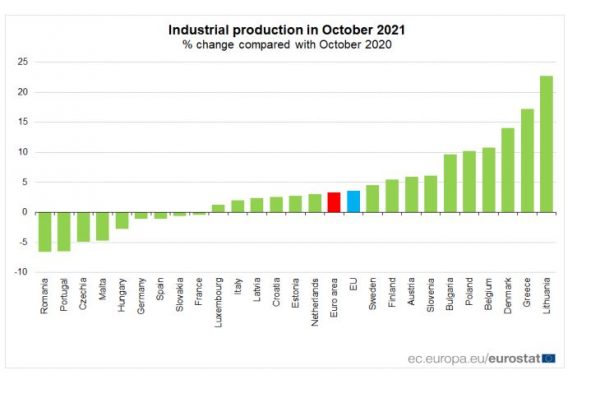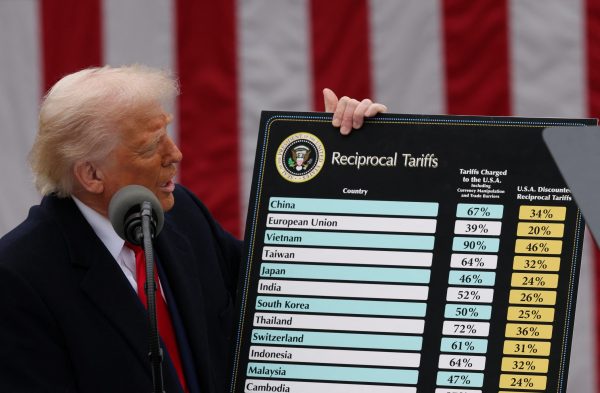
In October 2021, the seasonally adjusted industrial production rose by 1.1% in the euro area and by 1.2% in the EU, compared with September 2021, according to estimates from Eurostat, the statistical office of the European Union. In September 2021, industrial production fell by 0.2% in the euro area and by 0.5% in the EU.
In October 2021 compared to October 2020, industrial production increased by 3.3% in the euro area and by 3.6% in the EU.
Monthly comparison by main industrial grouping and by Member State
In the euro area in October 2021, compared with September 2021, production of capital goods rose by 3.0%, durable consumer goods by 1.7%, non-durable consumer goods by 0.4% and energy by 0.1%, while production of intermediate goods fell by 0.6%.
In the EU, production of capital goods rose by 3.0%, energy by 1.7%, durable consumer goods by 1.3% and nondurable consumer goods by 0.7%, while production of intermediate goods fell by 0.3%.
Among Member States for which data are available, the highest monthly increases were registered in Germany and Slovakia (both + 3.0%), Greece (+ 2.5%) and Denmark (+ 2.1%). The highest decreases were observed in
Estonia (-2.4%), Latvia (-1.5%), the Netherlands and Romania (both -0.9%).
Annual comparison by main industrial grouping and by Member State

In the euro area in October 2021, compared with October 2020, production of non-durable consumer goods rose by 6.9%, capital goods by 5.2%, durable consumer goods by 2.3% and intermediate goods by 2.1%, while production of energy fell by 1.0%.
In the EU, production of non-durable consumer goods rose by 7.9%, capital goods by 3.5%, energy by 3.1% and both intermediate goods and durable consumer goods by 2.6%.
Among Member States for which data are available, the largest annual increases were registered in Lithuania (+ 22.7%), Greece (+ 17.2%) and Denmark (+ 14.0%). The highest decreases were observed in Romania (-6.6%), Portugal (-6.5%) and the Czech Republic (-4.9%).
Latest News

Trump Tariffs Jeopardize Growth: Piraeus Chamber of Commerce
The tariffs, aimed at reducing the U.S. trade deficit, are expected to have both direct and indirect effects on the European economy

EU Condemns Trump Tariffs, Prepares to Retaliate
As tensions escalate, the EU is expected to continue negotiations with Washington while preparing for potential economic retaliation.

The Likely Impact of Trump Tariffs on Europe and Greece
Trump tariffs are expected to negatively affect economic growth in the Eurozone while Greece's exports could take a hit.

Motor Oil Results for 2024: Adjusted EBITDA of 995 mln€; Proposed Dividend of 1.4€ Per Share
Adjusted EBITDA for 2024 was down 33% yoy. The adjusted profit after tax for 2024 stood at 504 million euros, a 43% decrease from the previous year

Cost of Living: Why Greece’s 3% Inflation Is Raising Alarm
Greece appears to be in a more difficult position when it comes to price hikes, just as we enter the era of Trump’s tariffs.

Fitch Ratings Upgrades the Four Greek Systemic Banks
NBG’s upgrade reflects the bank’s ongoing improvements in its credit profile, Fitch notes in its report, including strong profitability, a reduction in non-performing exposures (NPEs), and lower credit losses

Trump to Announce Sweeping New Tariffs Wednesday, Global Retaliation Expected
With Trump's announcement just hours away, markets, businesses, and foreign governments are bracing for the fallout of one of the most aggressive shifts in U.S. trade policy in decades.

Inflation in Greece at 3.1% in March, Eurostat Reports
Average inflation in the eurozone settled at 2.2%, compared to 2.3% in February

Greece’s Unemployment Rate Drops to 8.6% in February
Despite the overall decline, unemployment remains higher among women and young people.

Jerry Kalogiratos Highlights Key Role of Energy Transition and Data Demand in LNG Outlook
Energy transition and the prospects of LNG were discussed at Capital Link’s 19th Annual International Maritime Forum, during a panel discussion with Jerry Kalogiratos (Capital Clean Energy Carriers Corp.)
























![ΕΛΣΤΑΤ: Αυξήθηκε η οικοδομική δραστηριότητα κατά 15,6% το Δεκέμβριο [πίνακες]](https://www.ot.gr/wp-content/uploads/2025/03/DSC9655-2-1024x569-1-90x90.jpg)

















 Αριθμός Πιστοποίησης
Αριθμός Πιστοποίησης